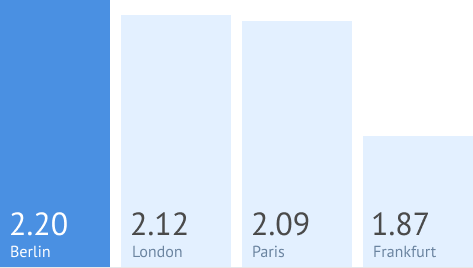Property investment in Germany
The German real estate market continues to attract attention of investors from all over the world. A strong economy, an independent judicial system and low unemployment are the pillars that underpin capital security and steady profits.
Alongside with investors, Germany is a draw for professionals working in different lines, students, and labourers. Therefore, the number of people in big cities grows each year driving demand for housing, goods, and services. These are favourable prerequisites for rental business in the residential and commercial segments.
Prices in the German real estate market seem to stay steady or go up. This is especially the case in big cities. German real estate has once again proven its high reliability even in a crisis

Popular investment properties in Germany
| Type | Budget, € | Yield | German legal entity |
|---|---|---|---|
| Microapartments | from 150 000 | 2—4,5% | not required |
| Apartments | from 400 000 | 2—4,5% | not required |
| Apartment buildings | from 800 000 | 0,5—4% | required |
| Supermarkets | from 1,5M | 3—5,5% | required |
| Retirement homes | from 3M | 3,5—5,5% | required |
| Hotels | from 5M | 3,5—6% | required |
| Other commercial property | from 2M | 4—5% | required |
Big apartments and detached suburban houses with green areas are gathering momentum: after the lockdowns families want to have more space to live and rest comfortably.

Prices of apartments and rental rates for new developments in German cities

Residential property prices in Germany have already been increasing noteworthily for some years in a row. Given that there is still a shortage of housing on the market, we expect prices to continue to rise
| Apartments | Houses |
|---|---|
| +11,46% 2021 | +14,73% 2021 |
| +13,61% 2020 | +8,04% 2020 |
| +10,22% 2019 | +7,95% 2019 |
PwC expects Berlin to be the best city for real estate investments in 2021.
The acute housing shortage and rather well-performing economy are setting the stage for steady rent income flows that do not suspend even in a crisis.
Suburban development
The COVID-19 pandemic added momentum to the deurbanisation trend. Now buyers are more interested in city suburbs and towns close to big cities. Remote work has become the new normal for many eliminating the need to look for an apartment near an office.
It is widely expected that population growth in the suburbs will be a powerful engine stimulating development of infrastructure for life. As the suburban infrastructure is getting more mature, small and mid-sized businesses would be lured to come here igniting demand for commercial spaces.
According to Engels&Völkers, the up-and-coming German locations will be Brandenburg, Potsdam, and towns close to Munich and Frankfurt. Transport accessibility would be the main driver for development of these locations.
Commercial real estate in Germany
Commercial real estate generates higher yield than residential properties, yet as the yield curve goes up, so does the risk exposure: there are fewer potential tenants and the rates are sensitive to economic environment changes.
After all, the higher the stated yield is, the riskier the property is. A tenant-occupied central property that does not need renovation would yield 6% at the utmost. If the stated yield is higher than that, there might be clandestine risks the buyer does not disclose.
-
1M €minimum investment
-
4–6 %annual rental yield
-
5 yearsrecommended minimum divestment period
-
15.8 %tax on rental income for legal entities
According to Tranio, about 25% commercial real estate buyers opt for supermarkets in Germany. We see the uptick of this trend now in the crisis
Tranio Senior Investment Consultant

Federal states of Germany
- Commercial property for sale in Berlin
- Commercial real estate in Bavaria
- Commercial real estate in Munich
- Commercial real estate in Baden-Württemberg
- Commercial real estate in Frankfurt am Main
- Commercial real estate in Hamburg
- Commercial real estate in Dusseldorf
- Commercial real estate in Stuttgart
- Commercial real estate in Karlsruhe
- Commercial real estate in Freiburg
- Property for sale in Berlin
- Property for sale in Bavaria
- Property for sale in Munich
- Property for sale in Baden-Baden
- Property for sale in Dusseldorf
- Property for sale in Hamburg
- Property for sale in Frankfurt am Main
General investment climate
The highest GDP in Europe in 2020
Despite the COVID-19 pandemic, Germany showed the highest GDP of the other European countries and the UK.
The economy of Germany is one the strongest in Europe. This guarantees robustness of the real estate market.

Ranking five in rule of law index
The World Justice Project issues a global rule of law index each year.
The index relies on the following indicators: legal constraints on governmental powers, absence of corruption, safety and security, civil and criminal justice, and others.

Despite the crisis, the unemployment rate in Germany is materially lower than the rates in the other European countries.
Most of the tenants maintain their good financial standings and manage to discharge their rental liabilities. Thus, residential rentals remain the least risky business.

